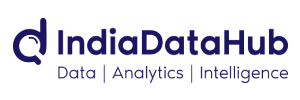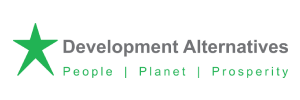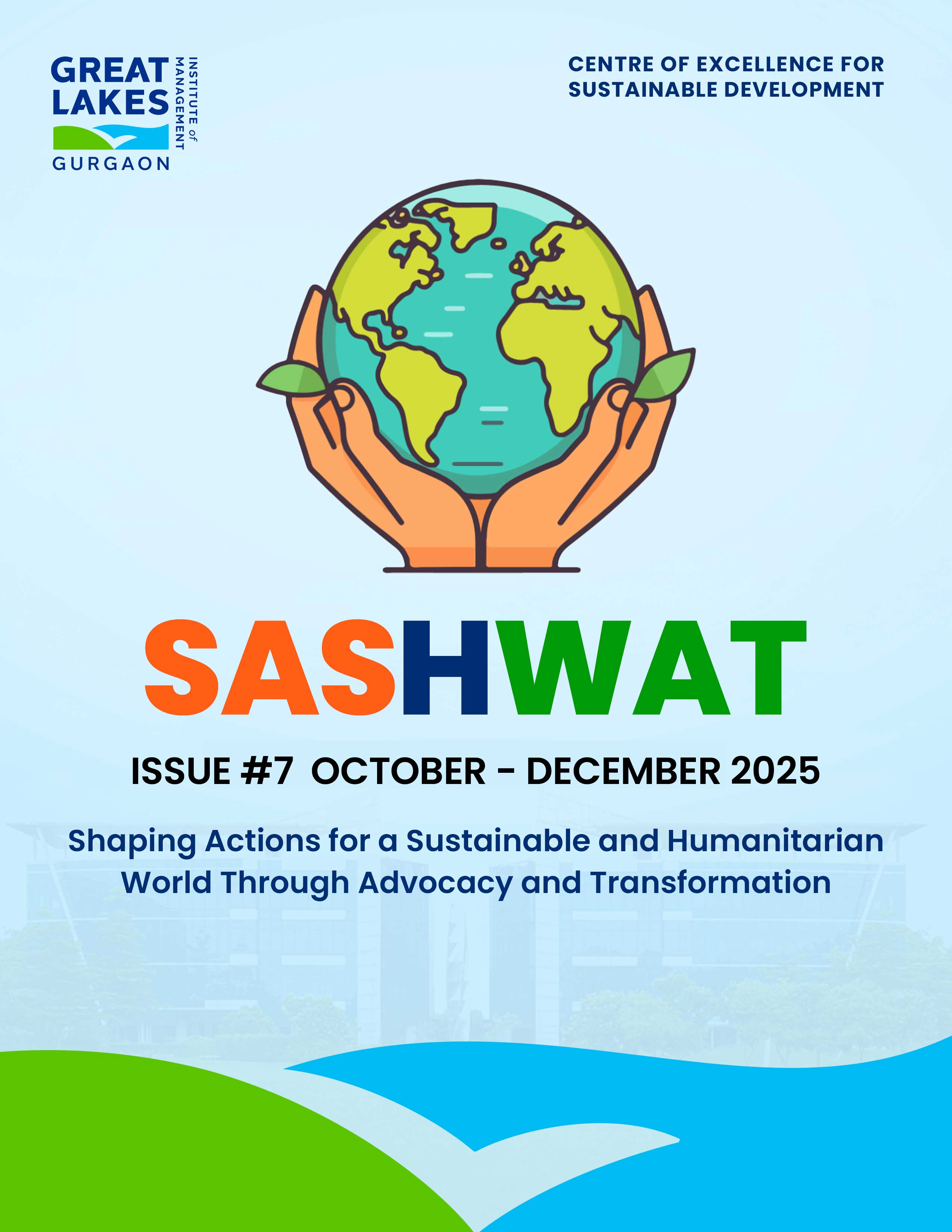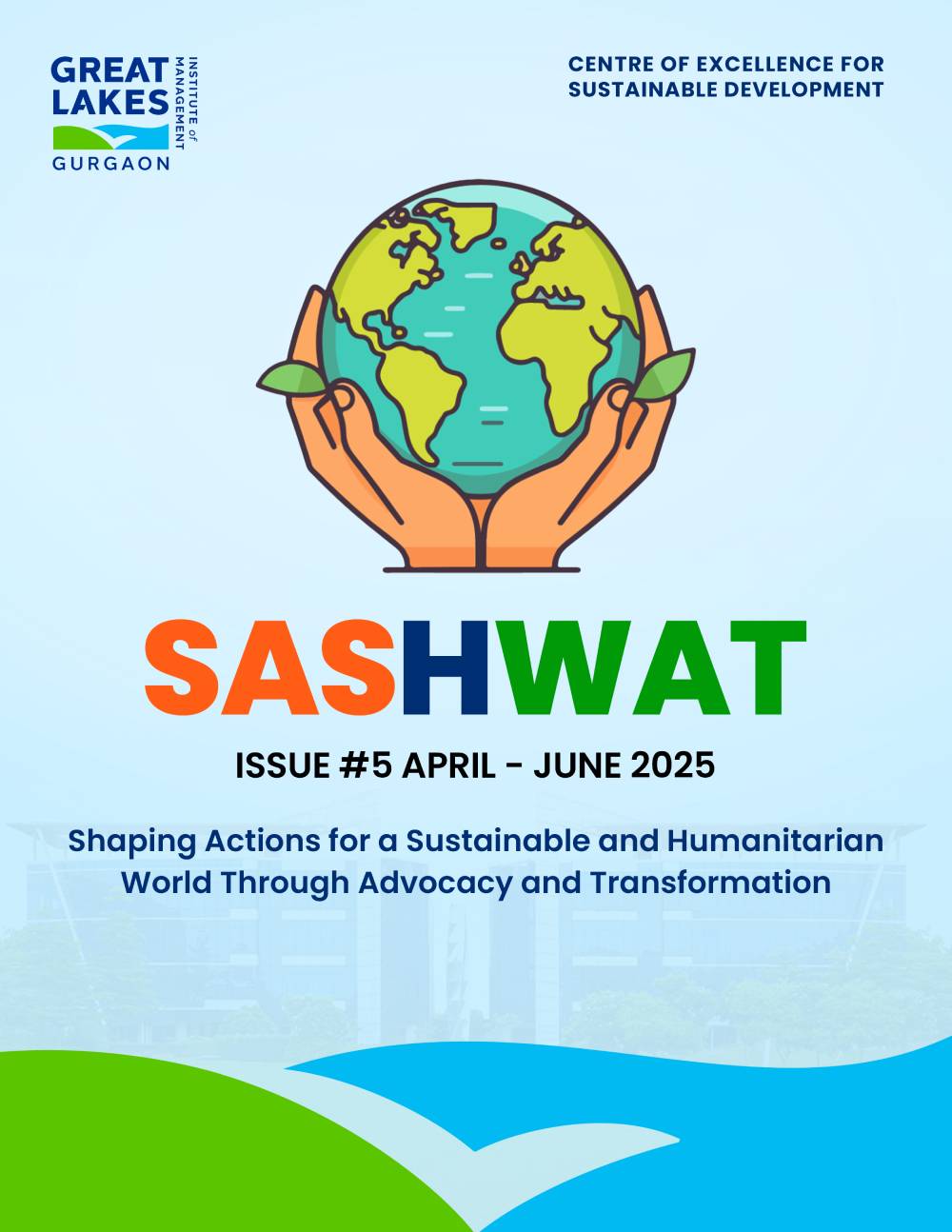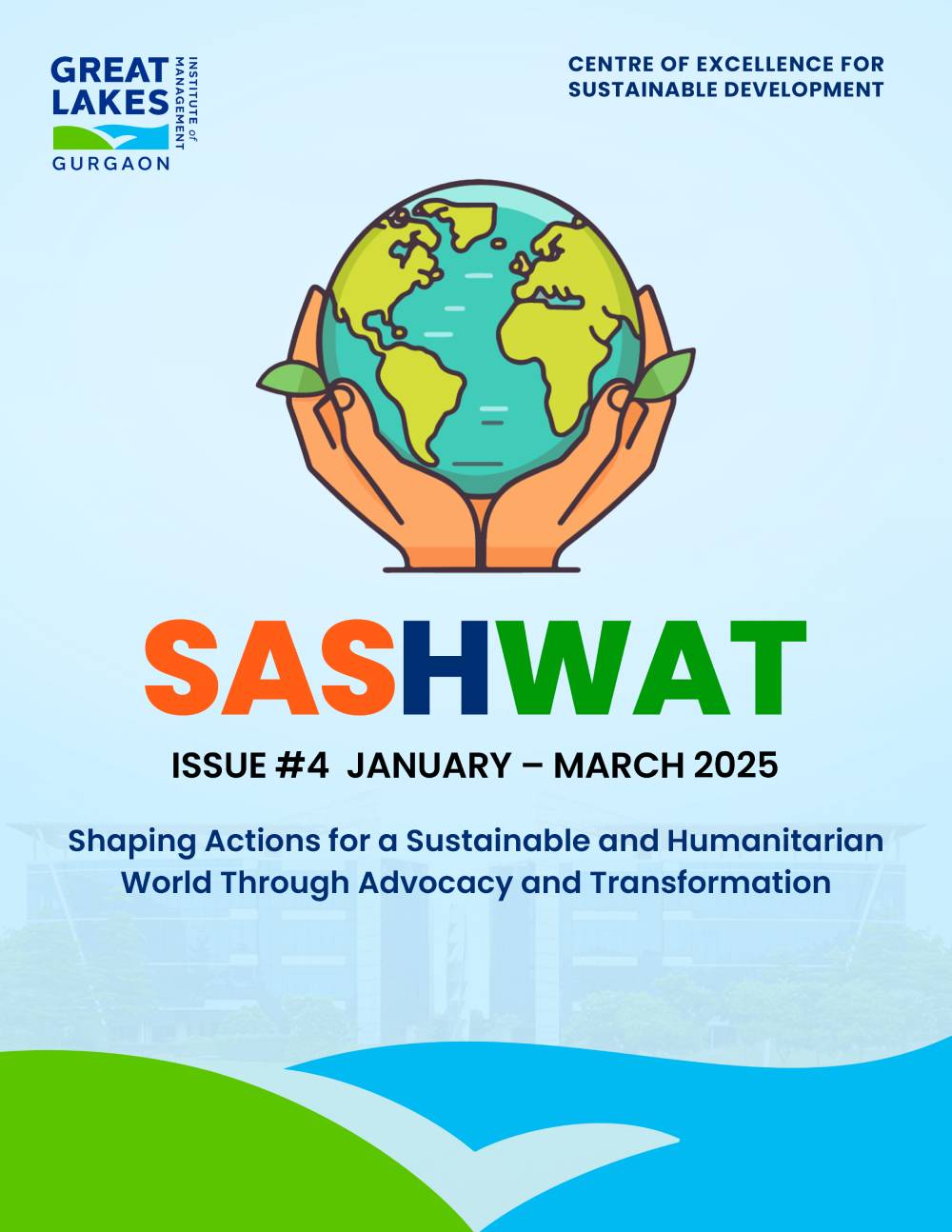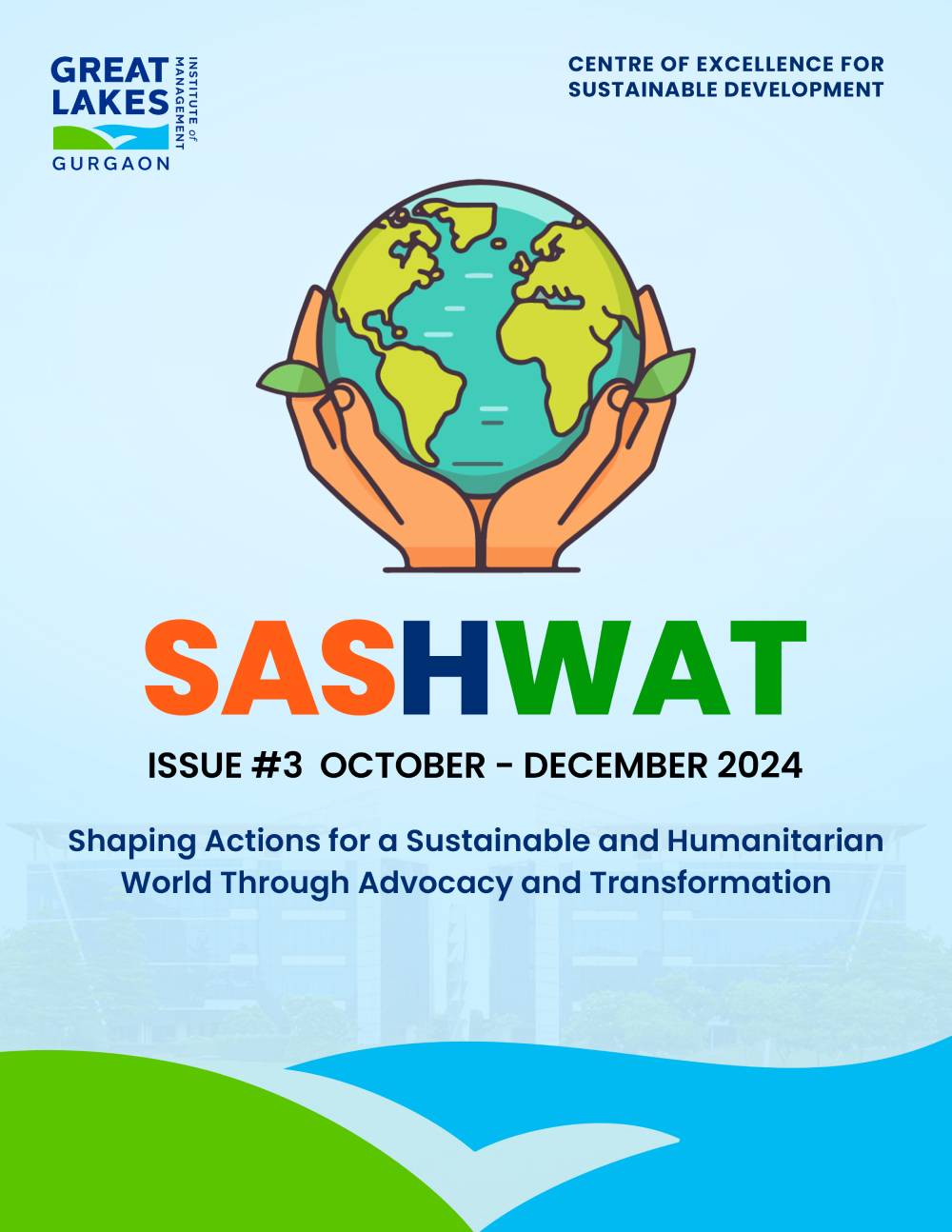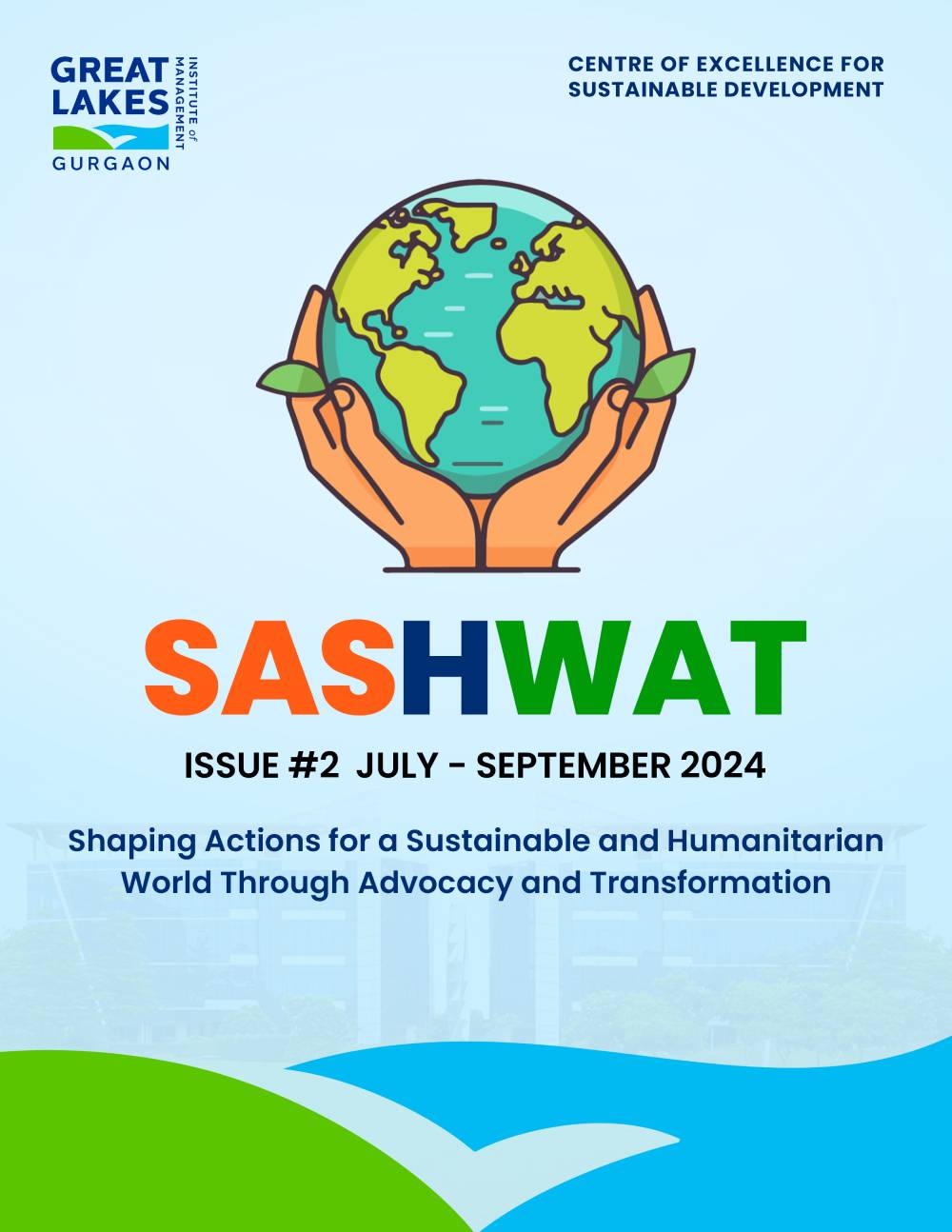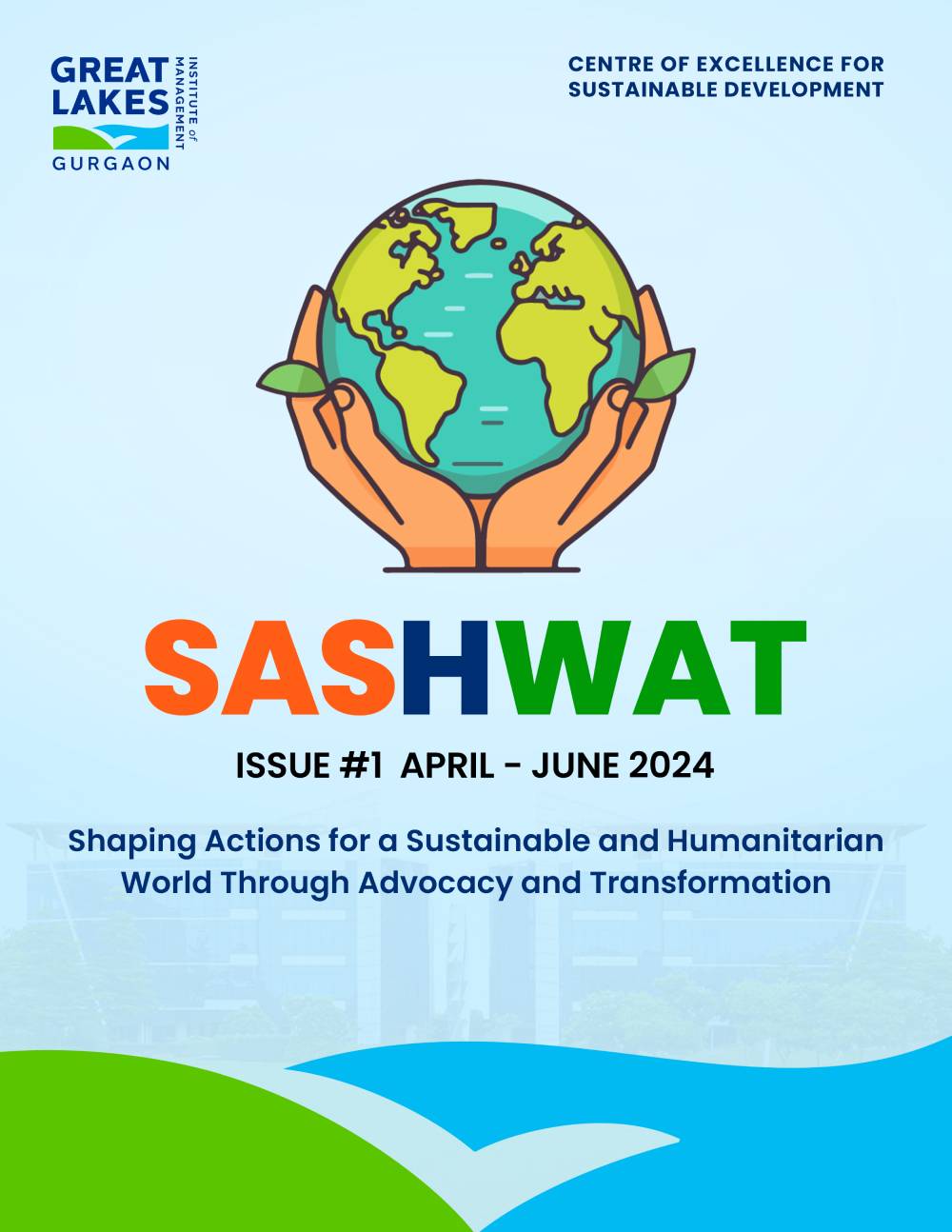
About
Overview
The Center of Excellence for Sustainable Development at Great Lakes, Gurgaon has been set up in alignment with the Institute’s Vision and Mission of contributing to creation of a sustainable society. The Center endeavors to create a collaborative environment to embark upon cutting-edge research, its dissemination and outreach, course curriculum and content development to support teaching aspirations, and community engagement within the context of the Sustainable Development Goals, with specific focus on selected few SDGs. The Center leverages the inherent expertise available with Great Lakes, Gurgaon for data driven decision making for stakeholders. The activities undertaken by the Center have internal as well as external channels of engagement through thought as well as action-based outcomes.
Set up in April 2023, the Center is currently headed by Dr. Sanghamitra Bhattacharyya, Professor, at Great Lakes, Gurgaon.
Objectives
The list of 17 Sustainable Development Goals (SDGs) and their sub-goals formulated in 2015 together provide nearly 200 actionable goals to be achieved by 2030. The CoE for Sustainability of Great Lakes, Gurgaon aims to address some selected SDGs, through training, consultancy, workshops, conferences and research. The list of SDGs that the Center intends on focus on are merely indicative at this stage.
Overall, the objectives of the CoE are:
- to contribute to creating environmentally and socially responsible business managers
- to emerge as a credible thought-leader with intellectual contributions that can make businesses and societies sustainable
- to help support the implementation of best practices in businesses, organizations and communities to create a more sustainable society
Activities
Since its inception in April 2023, the Center has engaged in a wide range of activities:
- Multiple op-eds and articles in business press have been published, relating to various aspects of SDGs and India’s progress on the same.
- Original research articles on sustainability are regularly published in peer reviewed journals.
- A quarterly newsletter – SASHWAT (Shaping Actions for a Sustainable and Humanitarian World Through Advocacy and Transformation) is published, with compilation of various aspects of sustainability, both in India and globally.
- A first-of-its-kind SCORE (Sustainability Content Occurrence and Relevance Evaluation) Index has been developed by the Center, in collaboration with IndiaDataHub. It was launched during the 3rd International Winter Conference on Sustainable Business. The SCORE Index captures the extent to which the business media is expending efforts, through their publications, to disseminate sustainability related content and raise awareness among citizens.
- Construction of a Monthly Prosperity Index using satellite data is underway.
- A tool for measuring individual’s Environmental Quotient – EvQ (similar to IQ and EQ) is currently under development by Great Lakes Gurgaon faculty.
- The annual international conference of Great Lakes Gurgaon – the Winter Conference for Sustainable Business – is held every December, under the aegis of the Center, at the Gurgaon campus. The first conference was held on 19th and 20th Dec 2022, with the theme of “International Perspectives in Economics & Management for Sustainability”. On 20th and 21st December 2023, the 2nd Conference was held with the theme of “Managing Businesses for a Sustainable Future: G-20 and beyond". On 19th and 20th Dec 2024, the 3rd edition of the International Winter Conference was held with the theme of " Roadmap to Sustainability: Challenges & Opportunities of Business Models and Practices. The conference, attended by delegates from India and abroad, serves as a platform for academicians and industry practitioners to explore innovative theories and applications of ‘sustainability’ in various domains of management practice. The conference also hosts panel discussions with reputed speakers from business organizations, policy makers and think tanks, and academia, from India and abroad.
- The Center is a member of the UN Principles for Responsible Management Education (PRME) as well as IUSDRP (Inter-University Sustainable Development Research Programme) of the University of Hamburg.
- The Center has recently signed a MOU with Development Alternatives for collaborating on various sustainability related projects and initiatives
SCORE Index
About SCORE Index
The SCORE (Sustainability Content Occurrence and Relevance Evaluation) Index is a weekly metric designed to track and evaluate public discourse surrounding sustainability and the United Nations Sustainable Development Goals (SDGs) in business media. The SCORE Index provides insights into how frequently and how prominently SDG-related topics are covered in leading business newspapers, helping to gauge the level of engagement with sustainability issues within the media.
The SCORE Index is calculated based on a comprehensive methodology that combines data extraction, frequency analysis, and weighted relevance of SDG-related terms. By measuring the occurrence and relevance of SDG terms and phrases across a selection of prominent business dailies, it helps stakeholders understand the evolving conversation around sustainability in the business world.
The SCORE Index is an essential tool for researchers, businesses, policy makers and journalists who are interested in understanding the prominence of sustainability-related topics in the media and monitoring how well business media are aligning with global sustainability goals.
Documents
The methodology document outlines the detailed process used to create the SCORE Index. It covers the identification of relevant SDG terms and phrases extracted from the official UN SDGs document, the assignment of weights to these terms based on their importance and connection to specific SDGs, and the use of technologies such as natural language processing and optical character recognition to gather and clean newspaper data. The document further explains how the frequency of SDG terms is analyzed, and how the final SCORE is calculated by combining these frequencies with their respective weights, ensuring the index is normalized and reflects the intensity of sustainability discussions across the media.”
Download SCORE Index MethodologyData
The Data Section presents the weekly SCORE for all 17 SDGs, reflecting the average score for each goal throughout the week. For each SDG, the section includes four additional columns: Open, Close, High, and Low. The Open score represents the SCORE value on Monday, marking the start of the week, while the Close score shows the value on Saturday, capturing the week's final score. The High and Low columns track the highest and lowest SCORE values recorded during the week, providing insights into fluctuations in media coverage of each SDG. These metrics offer a detailed view of the weekly trends, helping to understand both the consistency and variability in how sustainability issues are discussed in the media.
Download SCORE DataInsight
The Insights Section analyzes the weekly SCORE by categorizing news into three key groups: News Expected and Seen, which covers anticipated SDG topics that align with current trends; News Expected but Not Seen, highlighting important sustainability issues that were expected but not covered; and News Not Expected but Seen, which identifies unexpected sustainability topics that emerged in the media. This approach helps to uncover patterns in media coverage, revealing both the alignment and gaps in how sustainability issues are addressed in the news.
SDGs

Research and Publications
Research articles published in peer reviewed journals are given below:
- Lund, I.H., Shaikh, F., Harijan, K. Kumar, L, Dagar, V (2024). Prospects of natural gas consumption in Pakistan: based on the LMDI-STIRPAT PLSR framework. Environmental Science Pollution Research, 31, 2090–2103. https://doi.org/10.1007/s11356-023-31274-1
- Agarwal, A., & Ojha, R. (2024). Prioritizing implications of Industry-4.0 on the sustainable development goals: A perspective from the analytic hierarchy process in manufacturing operations. Journal of Cleaner Production, 141189.
- Chahal, J., Dagar, V. and Shoukat, M.H. (2024), "Sustainable entrepreneurship: examining stimulus-organism-response to the nexus of environment, education and motivation", Management Decision, Vol. ahead-of-print No. ahead-of-print. https://doi.org/10.1108/MD-04-2024-0845
- Dagar, V., Dagher, L., Rao, A., Doytch, N., & Kagzi, M. (2024). Economic policy uncertainty: Global energy security with diversification. Economic Analysis and Policy, 82, 248-263. https://doi.org/10.1016/j.eap.2024.03.008
- Dagar, V., Rao, A., Dagher, L., & Doytch, N. (2024). Climate change dynamics for global energy security and equity: Evidence from policy stringency drivers. Journal of Environmental Management, 370, 122484. https://doi.org/10.1016/j.jenvman.2024.122484
- Kagzi, M., Dagar, V., Doytch, N., Krishnan, D., & Raj, M. (2024). Curbing environmental degradation to balance sustainable development: Evidence from China. Environmental and Sustainability Indicators, 24, 100465. https://doi.org/10.1016/J.INDIC.2024.100465
- Lund, I. H., Shaikh, F., Harijan, K., Kumar, L., & Dagar, V. (2023). Prospects of natural gas consumption in Pakistan: based on the LMDI-STIRPAT PLSR framework. Environmental Science and Pollution Research, 31(2), 2090–2103. https://doi.org/10.1007/s11356-023-31274-1
- Ojha, R., & Agarwal, A. (2023). Implications of circular production and consumption of electric vehicle batteries on resource sustainability: A system dynamics perspective. Environment, Development and Sustainability, 1-25.
- Piwowar-Sulej, K., Iqbal, Q., Dagar, V., & Singh, S. (2024). Employees’ eco-friendly innovative behaviors: Examining the role of individual and situational factors. European Management Journal. https://doi.org/10.1016/j.emj.2024.04.005
- Raghavendra, C., Mahesh, R., Khan, M. K., Dagar, V., Singh, S., & Alvarado, R. (2024). Impact of carbon emissions, renewable and non-renewable energy consumption on inbound cross-border mergers and acquisition’s investment inflow. Environment, Development and Sustainability. https://doi.org/10.1007/s10668-024-04511-x
- Ullah, I., Dagar, V., Tanin, T. I., Rehman, A., & Zeeshan, M. (2024). Agricultural productivity and rural poverty in China: The impact of land reforms. Journal of Cleaner Production, 475, 143723. https://doi.org/10.1016/j.jclepro.2024.143723
- Yadav, P., Agarwal, B. & Mathew, J. Indian voters’ attitude and behavior toward a political brand for producing green products: a mediation model. Futur Bus J 10, 41 (2024). https://doi.org/10.1186/s43093-024-00327-3
Business Press
- “Beyond Women’s Day: How Exogenous and Endogenous Events Shape Gender Discourse" by Dr. Sanghamitra Bhattacharyya, Ms. Nidhi Kumari, and Dr. Bappaditya Mukhopadhyay; CSR Times magazine (March 2025)
- “A Green blueprint for India’s electrical and electronics manufacturing sector: navigating the new tariff regime” (https://www.logisticsinsider.in/a-green-blueprint-for-indias-electrical-and-electronics-manufacturing-sector-navigating-the-new-tariff-regime/) by Dr. Sanghamitra Bhattacharyya & Uttam Kumar Mishra; Logistics Insider (July 2025)
- Achieving Environmental Sustainability in Production: The Role of Additive Manufacturing (2024 )(Dr. Jaya Priyadarshini) has been published in Manufacturing Today. https://www.manufacturingtodayindia.com/achieving-environmental-sustainability-in-production-the-role-of-additive-manufacturing
- Are Indian Business Media Publications Covering Enough News on Sustainability? New Index to Track", 2024 (Prof. Bappaditya Mukhopadhyay and Prof. Sanghamitra Bhattacharya ) has beenfeatured in Outlook Business. https://www.outlookbusiness.com/planet/industry/are-indian-business-media-publications-covering-enough-news-on-sustainability-new-index-to-track
- Sustainable design for a sustainable product lifecycle (Prof. Ravindra Ojha) has been published in India Today(https://www.manufacturingtodayindia.com/sustainable-design-for-a-sustainable-product-lifecycle/)
- Experts Encourage Youth To Explore Growing Career Opportunities In Social Development Sector (Prof. Sanghamitra Bhattacharyya) (https://thecsruniverse.com/articles/experts-encourage-youth-to-explore-growing-career-opportunities-in-social-development-sector)
- How B-Schools Are Teaching Future Leaders to Put the Planet Over Profit (Prof. Jones Mathew) (https://www.indiatoday.in/education-today/featurephilia/story/management-education-teaching-sustainability-consumerism-2591450-2024-08-31)
- Are Indian Business Media Publications Covering Enough News on Sustainability? New Index to Track, (2025) featured in Outlook Business. (Dr.Sanghamitra Bhattacharya) https://www.outlookbusiness.com/planet/industry/are-indian-business-media-publications-covering-enough-news-on-sustainability-new-index-to-track
- "Unpacking ONOS: India's Rs 6,000-Crore Scheme Offering Free Access and Equality in Research", filed by Roshni Chakrabarty, Chief Sub Editor at India Today Education. https://www.indiatoday.in/education-today/featurephilia/story/onos-one-nation-one-subscription-research-scheme-free-journal-download-from-jan-1-experts-opinions-2653497-2024-12-22
- Thriving as a working mother: How to redefine success and silence guilt.(Dr. Vibhav Singh,) has been published in Times of India. https://timesofindia.indiatimes.com/life-style/parenting/moments/thriving-as-a-working-mother-redefining-success-and-silencing-guilt/articleshow/115631416.cms
- COP29: How $300 Billion Climate Funding is an Optical Illusion( Dr. Simarjeet Singh and Dr. Kirti Sharma) has been published in FirstPost. https://www.firstpost.com/opinion/cop29-how-300-billion-climate-funding-is-an-optical-illusion-13840507.html
- Is Accelerated Growth of AI Likely to Impact the UN SDGs? 2025( Dr. Ravindra Ojha) has been published in The Week. https://www.theweek.in/news/sci-tech/2025/01/08/opinion-prof-ravindra-ojha-is-accelerated-growth-of-ai-likely-to-impact-the-un-sd-gs.html#:~:text=With%20the%20accelerated%20growth%20of,(Responsible%20consumption%20and%20production).
- Beyond Women’s Day: How Exogenous and Endogenous Events Shape Gender Discourse(2025) (Dr. Sanghamitra Bhattacharyya, Ms. Nidhi Kumari, and Dr. Bappaditya Mukhopadhyay ,Mr. Alankar Shirsath)has been published in CSR Times magazine https://www.csrtimes.org/beyond-womens-day/
- Empathy in Leadership: How Women Are Redefining Corporate Culture, ( Dr. Sanghamitra Bhattacharyya) has been published in People Matters Global. Article: Empathy in Leadership: How women are redefining corporate culture.
- Why More Women in AI & Data Science Is Crucial, ( Dr. Sanchita Kuchi and Dr. Simranjeet Singh) has been featured in ET Education. Why More Women in AI & Data Science Is Crucial, Education News, ET Education
- Why India Needs More Women in the Workplace, (Dr Poornima Gupta)has been published in SightsIn Plus magazine. https://sightsinplus.com/insight/diversity-inclusion/why-india-needs-more-women-in-the-workplace/
- “Beyond Women’s Day: How Exogenous and Endogenous Events Shape Gender Discourse" by Dr. Sanghamitra Bhattacharyya, Ms. Nidhi Kumari, and Dr. Bappaditya Mukhopadhyay; CSR Times magazine (March 2025)
- “A Green blueprint for India’s electrical and electronics manufacturing sector: navigating the new tariff regime” (https://www.logisticsinsider.in/a-green-blueprint-for-indias-electrical-and-electronics-manufacturing-sector-navigating-the-new-tariff-regime/) by Dr. Sanghamitra Bhattacharyya & Uttam Kumar Mishra; Logistics Insider (July 2025)
- How India fares on Sustainable Development Goals – 4 graphs offer an insight (Prof. Sanghamitra Bhattacharyya & Prof. Bappaditya Mukhopadhyay) (April 2023: https://news.abplive.com/india-at-2047/opinion-how-india-fares-on-sustainable-development-goals-4-graphs-offer-insight-1596349)
- UNSDGs need to be introduced into curriculum to prepare skilled managers to lead firms in sustainable development (Prof. Debashis Sanyal & Prof. Sanghamitra Bhattacharyya) (https://thecsruniverse.com/articles/unsdgs-need-to-be-introduced-into-curriculum-to-prepare-skilled-managers-to-lead-firms-in-sustainable-development)
- Can Green Credit Programme Change Behaviors Towards A Sustainable Future? (3rd Oct 2023: India Times-a Times of India publication) (Prof. Sanghamitra Bhattacharyya & Prof. Bappaditya Mukhopadhyay) (https://www.indiatimes.com/explainers/news/green-credit-programme-for-changing-behaviors-towards-a-sustainable-future-616399.html)
- Women's Reservation Bill 2023: The need to do more than just pass the bills (Forbes India, 8 Nov 2023: (Prof. Sanghamitra Bhattacharyya & Prof. Bappaditya Mukhopadhyay) https://www.forbesindia.com/article/great-lakes-institute-of-management/womens-reservation-bill-2023-the-need-to-do-more-than-just-pass-the-bills/89565/1)
- Empowering the Workforce for a Sustainable Future by Nurturing Green Skills in the Modern Era (Prof. Sanghamitra Bhattacharyya)(https://www.hr.com/en/app/blog/2024/03/great-lakes-gurgaons-academician-speaks-on-%C3%A2%C2%80%C2%98empo_lub7o9wd.htm (April 2024: Hr.com)
- Let’s use a behavioral insight to tackle climate change: (Prof. Bappaditya Mukhopadhyay) (https://www.pressreader.com/india/mint-hyderabad/20240501/282226605798152) (https://business.indianews.in/great-lakes-gurgaons-academician-speaks-on-empowering-the-workforce-for-a-sustainable-future-by-nurturing-green-skills-in-the-modern-era/#google_vignette)
- Is the Burgeoning Last Mile Delivery Becoming A Showstopper to Environmental Sustainability? (Prof. Ravindra Ojha) (Logistics Insider)
- Sustainable horizons: Unraveling the dynamics of ethical branding in 2024 Prof. Jones Mathew (https://www.financialexpress.com/business/brandwagon-sustainable-horizons-unraveling-the-dynamics-of-ethical-branding-in-2024-3517959/)
- Sustainable design for a sustainable product lifecycle (Prof. Ravindra Ojha) (https://www.manufacturingtodayindia.com/sustainable-design-for-a-sustainable-product-lifecycle/)
- Experts Encourage Youth To Explore Growing Career Opportunities In Social Development Sector (Prof. Sanghamitra Bhattacharyya) (https://thecsruniverse.com/articles/experts-encourage-youth-to-explore-growing-career-opportunities-in-social-development-sector)
- How B-Schools Are Teaching Future Leaders to Put the Planet Over Profit (Prof. Jones Mathew) (https://www.indiatoday.in/education-today/featurephilia/story/management-education-teaching-sustainability-consumerism-2591450-2024-08-31)
Winter Conference on Sustainable Business
1st International Winter Business School Conference (WBSC 2022)
On 19th and 20th December 2022, Great Lakes Institute of Management, Gurgaon hosted their first international conference, titled “International Perspectives in Economics & Management for Sustainability”, participated by renowned international and national speakers, researchers, representatives from industry as well as government of India. With this conference, which saw participation from nearly 75 delegates, Great Lakes, Gurgaon signaled its intention to emerge as a leading academic and research institute in the sphere of “Sustainable business practices” and offer to industry not only competent and environmentally responsible management professionals but also intellectual capital in all spheres of sustainability. Details of WBSC 2022 can be found on here.
2nd International Winter Business School Conference (WBSC 2023)
On 20th and 21st December 2023, the 2nd Winter Business School Conference with the theme of “Managing Businesses for a Sustainable Future: G-20 and beyond" was held in the Great Lakes, Gurgaon campus, under the aegis of the Center. The conference, attended by nearly 100 delegates from India and abroad, served as a platform for academicians and industry practitioners to explore innovative theories and applications of ‘sustainability’ in various domains of management practice. The conference also hosted panel discussions with reputed speakers from business organizations, policy makers and think tanks, and academia, from India and abroad. Details of WBSC 2022 can be found on here.
3rd International Winter Conference on Sustainable Business (WCSB 2024)
Great Lakes Institute of Management, Gurgaon, India hosted its third International Research Conference ‘Winter Conference on Sustainable Business (WCSB),’ previously ‘Winter Business School Conference (WBSC), under the aegis of The Center of Excellence for Sustainable Development, at the Gurgaon campus on 19th & 20th December 2024. The theme for the conference was ‘Roadmap to Sustainability: Challenges and Opportunities for Business Models and Practices'. Details of WBSC 2024 can be found here.
UN PRME Membership
Great Lakes Institute of Management, Gurgaon is proud to become a Signatory Member of the United Nations supported Principles for Responsible Management Education (PRME). This initiative, which engages over 800 institutions globally, strives to elevate the role of sustainability in management education, preparing leaders to shape a sustainable future. Read More
Knowledge Partners
